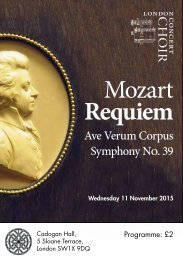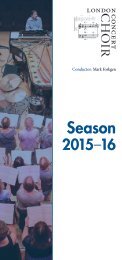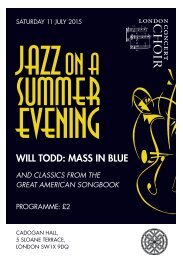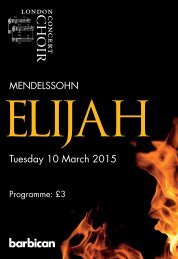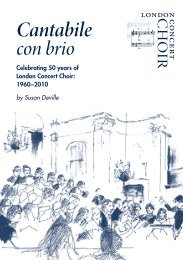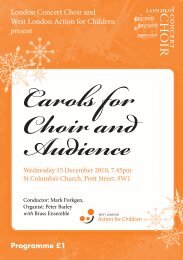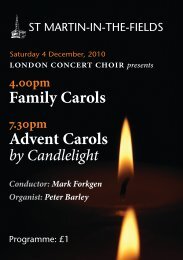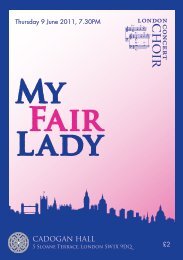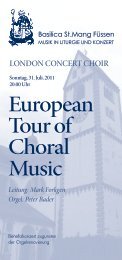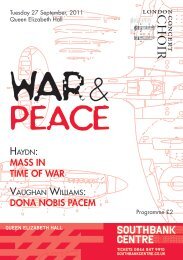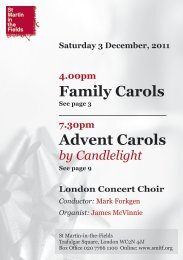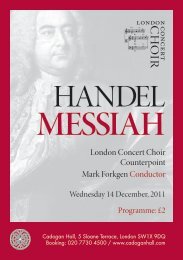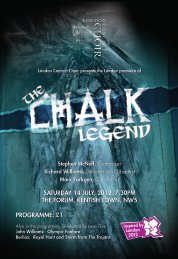20 October 2010: Orfeo ed Euridice (Gluck)
You also want an ePaper? Increase the reach of your titles
YUMPU automatically turns print PDFs into web optimized ePapers that Google loves.
W<strong>ed</strong>nesday, <strong>20</strong> <strong>October</strong> <strong>20</strong>10<br />
<strong>Orfeo</strong><br />
GLUCK<br />
<strong>ed</strong><br />
<strong>Euridice</strong><br />
concert performance<br />
Mark Forkgen conductor<br />
Michael Chance counter-tenor<br />
Erica Eloff soprano<br />
Mary Nelson soprano<br />
Counterpoint period instrument ensemble<br />
CADOGAN HALL<br />
5 Sloane Terrace,<br />
London SW1X 9DQ Programme: £2.50
WELCOME TO CADOGAN HALL<br />
In the interests of your comfort and safety, please note the following:<br />
• Latecomers will only be admitt<strong>ed</strong> to the auditorium during a suitable<br />
pause in the performance<br />
• Cadogan Hall is a totally non-smoking building<br />
• Glasses, bottles and food are not allow<strong>ed</strong> in the auditorium<br />
• Photography, and the use of any video or audio recording equipment,<br />
is forbidden.<br />
• Mobiles, Pagers & Watches: please ensure that you switch off your<br />
mobile phone and pager, and deactivate any digital alarm on your<br />
watch before the performance begins.<br />
• First Aid: Please ask a Steward if you require assistance.<br />
Thank you for your co-operation. We hope you enjoy the performance.<br />
___________________________________________________________________________________<br />
Programme Notes © Terry Barfoot<br />
Programme Design by Stephen Rickett (MasterPage - info@masterpage.net)<br />
Programme <strong>ed</strong>it<strong>ed</strong> by Eleanor Cowie<br />
London Concert Choir - A company limit<strong>ed</strong> by guarantee, incorporat<strong>ed</strong> in England<br />
with register<strong>ed</strong> number 32<strong>20</strong>578 and with register<strong>ed</strong> charity number 1057242.
GLUCK<br />
<strong>Orfeo</strong> <strong>ed</strong> <strong>Euridice</strong><br />
concert performance<br />
London Concert Choir<br />
Counterpoint period instrument ensemble<br />
Mark Forkgen conductor<br />
Michael Chance <strong>Orfeo</strong><br />
Erica Eloff <strong>Euridice</strong><br />
Mary Nelson Amore<br />
Act I, Scenes 1 and 2<br />
Act II, Scene 1<br />
INTERVAL<br />
Act II, Scene 2<br />
Act III, Scenes 1, 2 and 3
CHRISTOPH WILLIBALD VON GLUCK<br />
(1714-1787)<br />
<strong>Orfeo</strong> <strong>ed</strong> <strong>Euridice</strong><br />
Orpheus (counter-tenor)<br />
Eurydice (soprano)<br />
Amor, god of Love (soprano)<br />
Chorus, variously:<br />
Shepherds and nymphs, Furies and demons,<br />
Elysian heroes and heroines, followers of Orpheus<br />
<strong>Gluck</strong> was the chief figure among the operatic reformers of the 18 th century,<br />
and his <strong>Orfeo</strong> <strong>ed</strong> <strong>Euridice</strong> (Vienna, 1762) is one of the most important works<br />
in the history of music for the theatre. He was born in Bohemia, into a German<br />
family, and was <strong>ed</strong>ucat<strong>ed</strong> in Prague. In his early twenties he went to Vienna and<br />
then to Milan, where he became a violinist in the orchestra of Prince Antonio<br />
Melzi, while studying with the eminent composer Giovanni Sammartini. <strong>Gluck</strong>’s<br />
own operatic debut was with Artaserse (Milan, 1741), to a libretto by Pietro<br />
Metastasio, after which he pursu<strong>ed</strong> a nomadic career for several years, writing<br />
fifteen more operas in a decade.<br />
In the mid-1750s <strong>Gluck</strong> settl<strong>ed</strong> in Vienna, where French opéra-comique was all<br />
the rage, and this result<strong>ed</strong> in his collaboration with the dancing master Gaspero<br />
Angiolini, most notably in the ballet Don Juan, ou le festin de Pierre (Don Juan, or<br />
the Stone Banquet, Vienna, 1761). The following year the pair work<strong>ed</strong> together<br />
on a new opera, <strong>Orfeo</strong> <strong>ed</strong> <strong>Euridice</strong>.<br />
Describ<strong>ed</strong> as an azione teatrale per musica (musical play), <strong>Orfeo</strong> was a milestone<br />
in the movement towards operatic reform, whose subject was surely a deliberate<br />
choice in its aptness. The librettist was Raniero de Calzabigi (1714-1795),<br />
a poet who was ‘a great lover of women’, according to none other than Giacomo<br />
Casanova. By the time Calzabigi depart<strong>ed</strong> from Vienna in 1772 in the wake<br />
of an amorous scandal, he had provid<strong>ed</strong> <strong>Gluck</strong> with the texts of his three major<br />
reform operas, the others being Alceste (Vienna, 1767) and Paride <strong>ed</strong> Elena<br />
(Vienna, 1770).<br />
In some respects, however, <strong>Orfeo</strong> <strong>ed</strong> <strong>Euridice</strong> was a cautious beginning. The<br />
overture is a fairly conventional opening, less ambitious than the later example<br />
for Alceste, while the main role was written for a mezzo-soprano castrato, though<br />
Gaetano Guadagni was an exceptional singer who had studi<strong>ed</strong> acting with<br />
David Garrick.<br />
Calzabigi’s libretto concentrates on emotions and avoids stereotypes. The action<br />
is stripp<strong>ed</strong> of anything superfluous, while the ballets and choruses are always<br />
dramatically relevant. Although <strong>Gluck</strong> admir<strong>ed</strong> Handel, he react<strong>ed</strong> against the
conventions which govern<strong>ed</strong> the style of opera seria which that master wrote.<br />
Instead <strong>Gluck</strong> became preoccupi<strong>ed</strong> with creating a more naturally dramatic<br />
theatrical work, in which the display of virtuosity was replac<strong>ed</strong> by a more<br />
genuine concern for emotional states. Whereas the trend in previous operas had<br />
been to contain as many as ten scenes within an act, Calzabigi’s concentration<br />
on essentials r<strong>ed</strong>uc<strong>ed</strong> the number to two. A certain static quality in these great<br />
tableau-like scenes might be a tribute also to the Viennese audience, who it was<br />
felt could dispense with regular virtuoso diversions and absorb themselves in the<br />
passions depict<strong>ed</strong>.<br />
The score of <strong>Orfeo</strong> has various radical features. Since the dominance of the<br />
aria, so belov<strong>ed</strong> of Handel and the previous generation, was no longer the<br />
priority, each of the extend<strong>ed</strong> scenes tends towards a greater musical unity.<br />
There is little vocal coloratura (display), since the melodies are strong enough to<br />
stand in unadorn<strong>ed</strong> simplicity, not least the famous lament Che farò senza<br />
<strong>Euridice</strong>, which is sung by <strong>Orfeo</strong> after his wife dies for the second time.<br />
In Act II the scene is the entrance to Hades, where the hero is threaten<strong>ed</strong><br />
by the Furies, who instruct Cerberus the three-head<strong>ed</strong> dog-monster to tear<br />
to pieces anyone who approaches. But the sweetness of <strong>Orfeo</strong>’s music,<br />
reflecting his love for <strong>Euridice</strong>, charms them, and he is allow<strong>ed</strong> to pass.<br />
By contrast the serene flute solo in the Dance of the Bless<strong>ed</strong> Spirits is a<br />
touching evocation of the atmosphere in the Elysian Fields, a supreme example of<br />
<strong>Gluck</strong>’s intention ‘to restrict music to its true office of serving poetry by<br />
means of expression’.<br />
The chorus is fully involv<strong>ed</strong> in the drama and blossoms as a consequence.<br />
Recitative is always accompani<strong>ed</strong> by the orchestra, which itself is given a<br />
new significance, with the deployment of tone colour becoming a fundamental<br />
device. Then there are also important details such as the sound of <strong>Orfeo</strong>’s lyre,<br />
represent<strong>ed</strong> by the harp, the colour of the flute with its antique associations,<br />
and the trombones that lend such authority and mystery to supernatural scenes.<br />
<strong>Gluck</strong>’s reforms represent<strong>ed</strong> the fruit of collaboration rather than his work<br />
alone. He was a professional composer who provid<strong>ed</strong> music in the style he<br />
believ<strong>ed</strong> to be appropriate to the circumstances. During the 1770s he work<strong>ed</strong><br />
regularly in Paris, where for example castrato roles were not possible, and for<br />
the production there of Orphée in 1774 a high tenor (haute-contre) was us<strong>ed</strong> for<br />
the title role.<br />
<strong>Gluck</strong>’s creative gifts suit<strong>ed</strong> the urgent ne<strong>ed</strong> of his time, at least in Italian<br />
opera, to r<strong>ed</strong>ress the balance between music and drama. It was particularly<br />
in this context that he was much admir<strong>ed</strong> by Mozart, Wagner and Berlioz. If<br />
the praises of <strong>Gluck</strong>’s operas are sung more often than the works themselves,<br />
this may be because of the challenge involv<strong>ed</strong> in presenting them with the<br />
types of voices for which they were conceiv<strong>ed</strong>. The words of Berlioz<br />
offer the highest praise: “<strong>Gluck</strong> fills the heart with that fathomless nostalgia which<br />
is always awaken<strong>ed</strong> by the evocation of a glorious past.”
THE PERFORMING TRADITIONS OF ORFEO<br />
From the time of the 1774 Paris version the opera soon establish<strong>ed</strong> a repertory<br />
position across Europe, though initially more usually than not this was the Italian<br />
version, as in the performance conduct<strong>ed</strong> by Haydn at Eszterháza in 1776. During<br />
the earlier 19 th century the tenor Adolphe Nourrit was a famous Orpheus at the<br />
Paris Opéra, before in 1854 Liszt conduct<strong>ed</strong> the opera at Weimar, composing<br />
his own symphonic poem Orpheus as a replacement for the original overture. The<br />
first female singer in the title role was Jeanne Fabre at Milan in 1813, but as the<br />
century progress<strong>ed</strong> the most celebrat<strong>ed</strong> singer was Pauline Viardot, for whom in<br />
1859 Berlioz made his <strong>ed</strong>ition, combining what he consider<strong>ed</strong> to be the best of<br />
<strong>Gluck</strong>’s two versions.<br />
Since the 1870s, adaptations of Berlioz’s version, now sung in Italian, became<br />
increasingly popular, with a contralto Orpheus and restoring music from the 1774<br />
French version that Berlioz had omitt<strong>ed</strong>. The most famous of these hybrid versions<br />
was publish<strong>ed</strong> in 1889 by Ricordi.<br />
In the <strong>20</strong>th century all these various options remain<strong>ed</strong> possible, along with the<br />
highly effective transposition of the title role for a baritone.Distinguish<strong>ed</strong> singers<br />
such as Dietrich Fischer-Dieskau and Hermann Prey became closely associat<strong>ed</strong><br />
with the role, as did Kathleen Ferrier and Janet Baker.<br />
Tonight’s performance, which features a counter-tenor in the role of Orpheus, is of<br />
the original Italian version, but includes a chorus and some extra dances deriv<strong>ed</strong><br />
from the Paris version.<br />
© Terry Barfoot<br />
SYNOPSIS<br />
Overture<br />
Act I<br />
Scene 1: A grove containing the tomb of Eurydice amid an avenue of laurel<br />
and cypress trees<br />
Orpheus mourns the death of his belov<strong>ed</strong> Eurydice, echo<strong>ed</strong> by a chorus of<br />
nymphs and shepherds. He begs that the gods restore Eurydice to life or allow<br />
him to join her in death.<br />
Scene 2: Amor appears, and informs Orpheus that the gods have been mov<strong>ed</strong><br />
to pity by his profound sorrow. They will allow him to descend into Hades<br />
in order to lead Eurydice back from the dead. However, they stipulate one<br />
condition: he must never look back at Eurydice, nor offer an explanation for his<br />
behaviour, or she will be lost to him for ever. He realises the danger that this<br />
restriction brings, since he believes that Eurydice will doubt his love when he
looks away and turns from her. At the same time, he considers that with Amor’s<br />
help and the strength of his love, he will be able to overcome the restriction<br />
impos<strong>ed</strong> by the gods.<br />
Act II<br />
Scene 1: The terrifying entrance to Hades, beyond the river Cocytus, lies<br />
hidden in the distance by the thick smoke that bellows forth<br />
Orpheus is confront<strong>ed</strong> by a chorus of Furies and demons, who describe to him<br />
the kingdom of the dead: it is a place of terror and torment in equal measure.<br />
He replies that no such dangers can quell the fire of his ardent love. His song so<br />
charms the Furies that they allow him to pass and enter into Hades.<br />
INTERVAL – <strong>20</strong> Minutes<br />
Scene 2: The Elysian Fields, with beautiful flowers and arbours, groves and<br />
fountains. On the grassy slopes groups of Bless<strong>ed</strong> Spirits of heroes and heroines<br />
can be seen resting.<br />
Amid the radiant scene the chorus sings of the Valley of the Bless<strong>ed</strong>, which<br />
Orpheus now enters as he searches for Eurydice. He longs to find her, and begs<br />
the spirits to lead him towards her. His wish is grant<strong>ed</strong> and Eurydice is return<strong>ed</strong><br />
from the dead. Orpheus begins leading her away.<br />
Act III<br />
Scene 1: A dark labyrinthine grotto, surround<strong>ed</strong> by rocks, thickets<br />
and undergrowth<br />
Eurydice is delight<strong>ed</strong> to be reunit<strong>ed</strong> with Orpheus, who urges her to follow<br />
him and leave the kingdom of the dead. As soon as he releases her hand,<br />
she begins to doubt his love. She begs that he look at her, but he recalls the<br />
instruction of the gods and refuses her request, consequently she believes that<br />
he no longer loves her and refuses to follow him on the journey. Unable to<br />
hold back his emotions any longer, he turns; but at the very moment he gazes<br />
at Eurydice, she falls dead. Orpheus determines to kill himself so that he can<br />
follow Eurydice down into Hades.<br />
Scene 2: Amor appears and stays the hand of Orpheus, being mov<strong>ed</strong> to pity<br />
by this display of grief. Amor therefore restores Eurydice to life.<br />
Scene 3: The magnificent temple of Cupid<br />
The restoration of Eurydice to life, resulting from the depth and power of<br />
Orpheus’s love, is celebrat<strong>ed</strong> by dancing and a chorus of shepherds and<br />
shepherdesses.
Mark Forkgen – Conductor<br />
Mark Forkgen has been Music Director of London Concert<br />
Choir since 1996. He is also Music Director of Canticum<br />
and Principal Conductor and Artistic Advisor of Kokoro, the<br />
Bournemouth Symphony Orchestra’s New Music Group. He<br />
has work<strong>ed</strong> with a number of leading orchestras, including<br />
the Orchestra of the Age of Enlightenment, Royal Philharmonic<br />
Orchestra, Bournemouth Symphony Orchestra, City of London<br />
Sinfonia, English Chamber Orchestra, English Northern<br />
Philharmonia and the Composers’ Ensemble, appearing at<br />
all the major venues, including the Royal Festival Hall, the<br />
Barbican and the Royal Albert Hall.<br />
A specialist in the field of choral and contemporary music, Mark has given the first<br />
performances of around 100 works. These include stage works with the Trestle Theatre<br />
Company and Britten Sinfonia, and contemporary opera with the Unicorn Theatre<br />
Company and an ensemble from the Philharmonia, at the Linbury Studio Theatre,<br />
Royal Opera House, Covent Garden. His wide range of conducting also includes<br />
performances with Deep Purple and Mark Owen. In June <strong>20</strong>08 he took part with<br />
Canticum in the two opening concerts of the Chelsea Festival, recreating Pink Floyd’s<br />
Atom Heart Mother.<br />
Mark has been Conductor and Artistic Advisor for highly acclaim<strong>ed</strong> festivals including:<br />
Sir Peter Maxwell Davies’ 70th Birthday; Stravinsky, ‘A Festival of Britten’, ‘Music of the<br />
Americas’, ‘Britain since Britten’ and most recently ‘East meets West’. His recordings<br />
with Canticum and Kokoro have been highly recommend<strong>ed</strong> by BBC Radio 3 as well<br />
as both musical and national press. In Europe he has conduct<strong>ed</strong> in Spain, France,<br />
Belgium, Germany, Holland and the Czech Republic. He has also given performances<br />
of Stravinsky’s The Rite of Spring in Denmark, as well as Handel’s Messiah and Israel in<br />
Egypt in Siena and at the Viterbo Early Music Festival in Italy.<br />
Recent highlights include a series of Messiaen and Bartok concerts,Vaughan Williams’<br />
London Symphony, ‘Experimentalism to Mimimalism’, St Martin-in-the-Fields’ American<br />
Music Festival and Mozart’s Requiem in St Patrick’s Cath<strong>ed</strong>ral, Dublin.<br />
A champion of Youth Music, Mark was the Conductor of the Scottish Schools’<br />
Orchestra for ten years and Music Director of Ealing Youth Orchestra for eight years.<br />
He is currently Conductor of Dorset Youth Orchestra and Director of Music<br />
at Tonbridge School.
Michael Chance – Counter-tenor<br />
Michael Chance has establish<strong>ed</strong> a worldwide reputation as<br />
one of the foremost exponents of the male alto voice in all<br />
areas of the classical repertoire, and is in equal demand as<br />
an opera, concert and recording artist.<br />
His vocal training with Rupert Bruce Lockhart follow<strong>ed</strong> an<br />
English degree at King’s College, Cambridge where he<br />
was also a choral scholar. He has perform<strong>ed</strong> in the Sydney<br />
Opera House, Teatro Colon in Buenos Aires, La Scala<br />
Milan; in Florence, New York, Lisbon, Ovi<strong>ed</strong>o, Leipzig,<br />
Paris, Brussels, Amsterdam and with Covent Garden,<br />
Glyndebourne, and English National Opera.<br />
His roles include the title roles of <strong>Orfeo</strong>, Giasone, Giustino, Rinaldo and Ascanio in<br />
Alba, and Solomon; Ottone (L’incoronazione di Poppea), Athamas (Semele), Andronico<br />
(Tamerlano), Oberon (A Midsummer Night’s Dream), Tolomeo (Giulio Cesare) and<br />
Apollo (Death in Venice). He has had roles written specially for him by Sir Harrison<br />
Birtwistle (Orpheus in The Second Mrs Kong) and Judith Weir (A Military Governor in<br />
A night at the Chinese Opera). Recent festival appearances include Edinburgh, Aixen-Provence,<br />
BBC Proms, Salzburg and Bertarido in a new production of Handel’s<br />
Rodelinda for the Bayerische Staatsoper in Munich.<br />
Appearances in oratorio and recital have taken him to concert halls all over the world.<br />
He sings regularly with the viol consort Fretwork and has tour<strong>ed</strong> with them to Japan<br />
and the Unit<strong>ed</strong> States. His list of recordings is numerous and widespread. He receiv<strong>ed</strong><br />
a Grammy award for Handel’s Semele for DG. His recordings with John Eliot Gardiner<br />
include the Bach Passions and Cantatas, B Minor Mass, Monterverdi’s <strong>Orfeo</strong> and<br />
L’Incoronazione di Poppea and Handel’s Jeptha, Tamerlano and Agrippina. Other<br />
conductors he has record<strong>ed</strong> with include Trevor Pinnock, Franz Bruggen, Ton Koopman<br />
and Nicholas McGegan. His belief in extending the counter-tenor repertoire has<br />
prompt<strong>ed</strong> new work to be compos<strong>ed</strong> for him by Richard Rodney Bennett, Alexander<br />
Goehr, Tan Dun, Anthony Powers, John Tavener, and Elvis Costello, amongst others.<br />
His television appearances include A Night at the Chinese Opera, Death in Venice, The<br />
Fairy Queen, the three Monteverdi operas with Netherlands Opera, Poppea with Welsh<br />
National Opera and Messiah in Dublin with Sir Neville Marriner.<br />
Recent engagements have includ<strong>ed</strong> a tour with the Israel Camerata, a recital of music<br />
by Purcell at the Athens Concert Hall, performances at the Wigmore Hall and Kings<br />
Place with the Purcell Quartet, performances at the Concertgebouw, Handel’s Messiah<br />
with the Academy of Ancient Music, Bach B Minor Mass with the Vasari Singers, a<br />
European tour of Bach’s St John Passion with the Orchestra of the Eighteenth Century,<br />
Britten Canticles in Santiago, and performances of Peter Cowdrey’s new opera,<br />
The Lovely Ladies.<br />
Future engagements include Handel’s Messiah in Maulbronn, Haydn Nelson Mass at<br />
the Tonhalle Zurich, the world premiere of John Barber’s Consider the Lilies at St. Martinin-the-Fields,<br />
and a recital at Wimbl<strong>ed</strong>on Music Festival.<br />
Michael Chance was award<strong>ed</strong> the CBE in the <strong>20</strong>09 New Years Honours List.
Erica Eloff – Soprano<br />
Winner of the <strong>20</strong>08 London Handel Competition, Erica was<br />
born in South Africa. She graduat<strong>ed</strong> from the Potchefstroom<br />
University with a B.Mus degree and post-graduate Diploma<br />
in Performance (Cum Laude), studying voice with Werner<br />
Nel. In the UK she has studi<strong>ed</strong> with Lillian Watson and<br />
continues to study with Sheila Barnes.<br />
During her studies Erica was award<strong>ed</strong> several prizes and<br />
scholarships by national institutions including the F<strong>ed</strong>eration<br />
of Afrikaans Cultural Societies (FAK), the Southern African<br />
Music Rights Organisation (SAMRO) and the University of<br />
South Africa (UNISA). She was a prizewinner in the UNISA<br />
National and International Singing Competitions (<strong>20</strong>05 and <strong>20</strong>06), the Great Elm<br />
Vocal Awards (<strong>20</strong>06), the UFAM Concours Internationaux de Chant (<strong>20</strong>03) and the<br />
ATKV Forté (<strong>20</strong>00). She is also very grateful to Making Music who select<strong>ed</strong> her as a<br />
Philip and Dorothy Green Young Concert Artist in <strong>20</strong>08.<br />
Operatic roles in South Africa include Barbarina in Le nozze di Figaro, Despina in Così<br />
fan tutte, Adèle in Die Fl<strong>ed</strong>ermaus, Adina in L’elisir d’amore and the Queen of the Night<br />
in Die Zauberflöte. Since living in the UK she has sung Fiordiligi in Così fan tutte for<br />
British Youth Opera and Garsington Opera, the Queen of the Night (Die Zauberflöte)<br />
for Bearwood Opera, and First Lady (Die Zauberflöte) for Opera Project, Violetta (La<br />
Traviata) for Bearwood Opera and Belinda (Dido and Aeneas) for Bury Court Opera.<br />
Her many oratorio performances in the UK, Germany, Norway and South Africa<br />
include the Johannes- and Mattheus Passion and other cantatas by Bach; Beethoven’s<br />
Missa Solemnis; Messiah and Theodora by Handel; Haydn’s Creation; Gounod’s Messa<br />
di St. Cecilia; Krönungsmesse and Exsultate, jubilate by Mozart; Carmina Burana by<br />
Orff, with London Concert Choir; Schubert’s Mass in G major; Vaughan Williams’<br />
Ben<strong>ed</strong>icite, Hodie and Serenade to Music; Vivaldi’s Gloria; Dvorak’s Te Deum and<br />
the Requiems of Brahms, Fauré, Mozart, Rutter, Lloyd-Webber, Verdi and Martin Watt.<br />
Many of these performances took place in major concert venues including St. John’s,<br />
Smith Square, Cadogan Hall and the De Montfort Hall, Leicester. Career highlights<br />
include The Messiah from Scratch with Sir David Willcocks in the Royal Albert Hall,<br />
and Handel’s Theodora with Laurence Cummings and the London Handel Orchestra in<br />
Handel’s own church during the <strong>20</strong>09 London Handel Festival.<br />
In recital, Erica has perform<strong>ed</strong> Handel cantatas and arias at St. George’s, Hanover<br />
Square, and has given recitals at all the major South African Arts Festivals. She made<br />
her Wigmore Hall solo debut in their <strong>20</strong>08/09 season as a Kirckman Young Artist, and<br />
was invit<strong>ed</strong> for a return visit to the hall as part of their <strong>20</strong>09/10 season. As an active<br />
chamber musician, she has perform<strong>ed</strong> world premieres of works by South African and<br />
English composers, including James Wilding’s Slaap, klein beminde, Hannes Taljaard’s<br />
Wiegieli<strong>ed</strong>jies I & II and Stabat Mater, and Patrick Hawes’ Lazarus Requiem. Future<br />
engagements include various recitals throughout the UK and Belinda in Dido and<br />
Aeneas in Italy.
Mary Nelson – Soprano<br />
Born in Northern Ireland, Mary Nelson was recently elect<strong>ed</strong><br />
as an Associate of the Royal Academy of Music where she<br />
studi<strong>ed</strong>. She made her debut with English National Opera<br />
as Wood Nymph in Rusalka, follow<strong>ed</strong> by Amor in Orpheus<br />
and Eurydice and Belinda (Dido and Aeneas). An ENO<br />
Company Principal from 1999 to <strong>20</strong>04, her subsequent<br />
roles includ<strong>ed</strong> Susanna, Pamina, Dalinda in Ariodante,<br />
Atalanta in Xerxes, Trash in The Fairy Queen (with<br />
performances in the Gran Teatro del Liceu in Barcelona),<br />
and Lucia in The Rape of Lucretia for ENO and the<br />
Aldeburgh Festival, also broadcast on BBC TV and Radio 3.<br />
Other roles include Carolina in The Secret Marriage (Opera North), Gilda in Rigoletto,<br />
Micaela in Carmen (Castleward Opera) Piacere in Handel’s Il Trionfo del Tempo e del<br />
Disinganno (Early Opera Company), Ismene in Mitradate (Classical Opera Company)<br />
and Echo in a concert performance of Ariadne auf Naxos at the Barbican with the City<br />
of London Sinfonia conduct<strong>ed</strong> by Richard Hickox. She also sang Poulenc’s Gloria and<br />
Faure’s La Fête Étrange at the Royal Opera House.<br />
An experienc<strong>ed</strong> oratorio and concert soloist, her many performances include Mozart’s<br />
Requiem and Bach’s St. Matthew Passion with the City of London Sinfonia at the Barbican,<br />
Vivaldi’s La Senna Festeggiante with The King’s Consort in The Netherlands and<br />
Spain, Purcell’s Dido and Aeneas and Handel’s Gloria with the Irish Chamber<br />
Orchestra (conduct<strong>ed</strong> by Nicholas McGegan), Bach’s St. John Passion with the<br />
Orchestra of the Age of Enlightenment, Britten’s Les Illuminations and Handel’s Gloria<br />
for the Israel Camerata, and Brahms’ Requiem with the Netherlands Radio Symphony<br />
Orchestra. She has work<strong>ed</strong> with conductors including Christian Curnyn, Jane Glover,<br />
Thierry Fischer, David Hill, Richard Hickox, John Nelson, Kenneth Montgomery and<br />
Takuo Yuasa, with orchestras including the Academy of Ancient Music, BBC Concert Orchestra,<br />
Bournemouth Symphony Orchestra, English Chamber Orchestra, Hallé Orchestra,<br />
Royal Philharmonic Orchestra, Royal Scottish National Orchestra, Scottish Chamber<br />
Orchestra and the Ulster Orchestra. Her international engagements include appearances<br />
with the Brno Philharmonic Orchestra, Netherlands Radio Symphony Orchestra,<br />
the Israel Camerata, Music of the Baroque (Chicago), La Serenissima, and the Tenerife<br />
Symphony Orchestra.<br />
She has also sung Sandman in Hansel and Gretel and Mendelssohn’s A Midsummer<br />
Night’s Dream at the BBC Proms. Her recordings include Mendelssohn Symphony No.<br />
2 (Naxos), Georg Schumann’s Jerusalem, du hochgebaute Stadt (Guild Music) and<br />
Vivaldi Cantatas (Gaudeamus). On the recital platform she has given concerts at the<br />
Wigmore Hall, Purcell Room, Kettle’s Yard (Cambridge), the Honiton, Chester, Gower,<br />
Cambridge festivals and Queen’s Festival, Belfast. She also recently undertook a recital<br />
tour of Argentina to great critical acclaim.<br />
Recent and forthcoming engagements include Faure’s Requiem with Thierry Fischer and<br />
Northern Sinfonia, Mozart’s Exsultate Jubilate and Mahler’s Fourth Symphony with John<br />
Nelson and the Tenerife Symphony Orchestra, Haydn’s Creation with the Prague<br />
Philharmonic and Jakub Hrusa, and Rossini’s Stabat Mater with the Ulster Orchestra.
London Concert Choir<br />
London Concert Choir has just celebrat<strong>ed</strong> its 50 th Anniversary.<br />
The choir began life in 1960 as Brompton Choral Society,<br />
bas<strong>ed</strong> at Holy Trinity Church, Brompton. Over the years<br />
the choir’s membership base and the scope of its musical<br />
activities expand<strong>ed</strong> and it was relaunch<strong>ed</strong> under its new<br />
name in 1986. There have been four conductors: Robert<br />
Munns, Donald Cashmore, Gregory Rose and the present<br />
conductor Mark Forkgen.<br />
Since its formation, the choir has continu<strong>ed</strong> to grow in size<br />
and ambition and now has around 150 members, of a wide<br />
range of ages. Notable for its unusually broad repertoire,<br />
the choir regularly appears at all the major London concert<br />
venues, including the Barbican, the Southbank Centre and<br />
St Martin-in-the-Fields as well as Cadogan Hall, and has sung<br />
in cath<strong>ed</strong>rals and other churches in and around the capital.<br />
The choir also undertakes foreign tours and looks forward to<br />
visiting Germany in July <strong>20</strong>11.<br />
During its anniversary season, the choir gave two memorable<br />
performances of Britten’s War Requiem: at the Barbican with<br />
Southbank Sinfonia and in Salisbury Cath<strong>ed</strong>ral with Dorset<br />
Youth Orchestra. Among major choral works in earlier<br />
seasons have been Dvorak’s Stabat Mater, Elgar’s The<br />
Dream of Gerontius and Vaughan Williams’ Sea Symphony<br />
– all with the Royal Philharmonic Orchestra at the Southbank<br />
Centre. At the Barbican the Choir has sung the Brahms<br />
German Requiem and Mendelssohn’s Lobgesang (Hymn of<br />
Praise), also with the RPO; and Beethoven’s Missa Solemnis<br />
with the English Chamber Orchestra.<br />
With the Counterpoint ensemble the choir gave the London<br />
premiere of a reconstruction of Mozart’s great C minor Mass,<br />
and has perform<strong>ed</strong> Haydn’s oratorio The Creation, Handel’s<br />
Coronation Anthems and Foundling Hospital Anthem, and<br />
Beethoven’s Mass in C and the Finale from his opera Fidelio.<br />
Previous concert performances of operas have includ<strong>ed</strong><br />
Purcell’s Dido and Aeneas with Counterpoint and Gershwin’s<br />
Porgy and Bess with the RPO. The choir has also<br />
present<strong>ed</strong> Duke Ellington’s Sacr<strong>ed</strong> Concert and Orff’s<br />
Carmina Burana, and appear<strong>ed</strong> in the Star Wars concerts at<br />
the O 2<br />
Arena. The choir often gives concerts for charity and<br />
has commission<strong>ed</strong> a number of new works over the years.<br />
Mark Forkgen<br />
Music Director<br />
Jonathan Beatty<br />
Principal Accompanist<br />
Bill Cook<br />
Chairman<br />
Will Tilden<br />
Concert Manager<br />
Barbara Whent<br />
Treasurer<br />
Stephen Rickett<br />
Design and<br />
Communications<br />
Jennifer Greenway<br />
Membership<br />
Eleanor Cowie<br />
Publicity<br />
Simon Livesey<br />
Company Secretary<br />
www.london-concert-choir.org.uk
Counterpoint<br />
The ensemble ‘Counterpoint’ was form<strong>ed</strong> in <strong>20</strong>00 specifically to work with vocal<br />
ensembles. Its membership is drawn from the leading young period instrument<br />
specialists living and working in London, players who have perform<strong>ed</strong> and record<strong>ed</strong><br />
with many of the leading British early music ensembles, such as the English Baroque<br />
Soloists, the Parley of Instruments, Florilegium, The Academy of Ancient Music and The<br />
English Concert.<br />
The members of Counterpoint have a great deal of expertise and are therefore<br />
comfortable in a wide range of idioms from Monteverdi through to Beethoven. The<br />
ensemble uses original instruments or excellent copies made using the latest theories<br />
and techniques of historic instrument manufacture.<br />
In the summer of <strong>20</strong>04 they open<strong>ed</strong> the prestigious Viterbo Early Music Festival in Italy,<br />
performing Handel’s Israel in Egypt with Canticum and Mark Forkgen. Further highlights<br />
have includ<strong>ed</strong> Handel’s Messiah, Bach’s St John Passion, St Matthew Passion and Mass<br />
in B Minor.<br />
Last year they perform<strong>ed</strong> Monteverdi’s Vespers at St Martin-in-the-Fields as well as<br />
Haydn’s Creation in the final concert of the Chichester Festival with Canticum.<br />
Counterpoint have previously join<strong>ed</strong> London Concert Choir in Haydn’s Nelson<br />
Mass, Handel’s Foundling Hospital Anthem, Mozart’s Solemn Vespers, Purcell’s Dido<br />
and Aeneas, the London premiere of the complet<strong>ed</strong> version of Mozart’s C Minor<br />
Mass, Beethoven’s Ninth Symphony, Haydn’s Creation at Guildhall and an<br />
all-Beethoven concert which includ<strong>ed</strong> the Mass in C and the Finale from Fidelio.<br />
1st Violin<br />
Pauline Nobes<br />
Fiona Hugget<br />
Eleanor Gilchrist<br />
James Toll<br />
Simon Koudrand<br />
Liz McCarthy<br />
Felicity Broome-Skelton<br />
2nd Violin<br />
Persephone Gibbs<br />
Ben Sansom<br />
Joanna Lawrence<br />
Pauline Smith<br />
Ann Monnington<br />
Viola<br />
Louise Hogan<br />
Stefanie Heichelheim<br />
Thomas Kirby<br />
Cello<br />
Gabriel Amherst<br />
Anna Holmes<br />
Bass<br />
Timothy Amherst<br />
Flute<br />
Katy Bircher<br />
Marta Goncalves<br />
Oboe<br />
Katharina Sprekelsen<br />
Frances Norbury<br />
Clarinet<br />
Jane Booth<br />
Katherine Spencer<br />
Bassoon<br />
Frances Eustace<br />
Horn<br />
Nick Benz<br />
Richard Lewis<br />
Trumpet<br />
Richard Fomison<br />
Richard Thomas<br />
Trombone<br />
Philip Dale<br />
Tom Lees<br />
Andrew Harwood-White<br />
Timpani<br />
Adrian Bending<br />
Harp<br />
Danielle Perrett
Members of London Concert Choir<br />
Soprano<br />
Rebecca Beresford<br />
Gillian Bibby<br />
Dagmar Binst<strong>ed</strong><br />
Elizabeth Blishen<br />
Sarah Burr<br />
Jane Cameron<br />
Alison Carpenter<br />
Jacqui Cartin<br />
Sarah Chesters<br />
Serena Cooper<br />
Eleanor Cowie<br />
Sally Davis<br />
Gillian Denham<br />
Susan Deville<br />
Nicola Dixon-Brown<br />
Emily Dresner<br />
Rachel Duffield<br />
Erika Emerson<br />
Cecily Footner<br />
Anna Ford<br />
Sarah French<br />
Lisa Gardner<br />
Johanna Goll<br />
Jennifer Greenway<br />
Katrina Howell<br />
Katie Hutt<br />
Christine Ingram<br />
Katy Jones<br />
Jane Joyce<br />
Caroline Kameen<br />
Vickie Kelly<br />
Anna Kosicka<br />
Rose Littlewood<br />
Susan Logan<br />
Kelly Lucas<br />
Susanna Lutman<br />
Rebecca Magowan<br />
Bridget Maidment<br />
Megan Maley<br />
Elite Marriott<br />
Heather McGill<br />
Jessica Metcalfe<br />
Jenny Moran<br />
Stephanie Moussadis<br />
Fiona Paterson<br />
Lisa Perkins<br />
Jutta Raftery<br />
Kate Rainford<br />
Rachel Rosenberg<br />
Rachel Scanlon<br />
Philippa Stroud<br />
Shereen Taylor-Berger<br />
Teresa Tilden<br />
Francesca Walsh<br />
Janet Wells<br />
Gabriel West<br />
Julie Wilson<br />
Alto<br />
Rebecca Allen<br />
Rachel Armstrong<br />
Helen B<strong>ed</strong>dall-Smith<br />
Venetia Browne<br />
Frances Cave<br />
Carys Cooper<br />
Deborah Curle<br />
Lizzie Davies<br />
Georgina Day<br />
Kathleen Dormer<br />
Alena Faltova<br />
Rebecca Foulkes<br />
Anna Garnier<br />
Mary Glanville<br />
Nancy Goodchild<br />
Victoria Green<br />
Muriel Hall<br />
Joan Herbert<br />
Tina Holderri<strong>ed</strong><br />
Caroline Holloway<br />
Anna Holzscheiter<br />
Chrina Jarvis<br />
Janet Jones<br />
Chris Joseph<br />
Sabine Koellmann<br />
Joanna Kramer<br />
Lorna Lewis<br />
Susan Lewis<br />
Sophie Littlewood<br />
Norma MacMillan<br />
Anna Metcalf<br />
Sophy Miles<br />
Carolyn Moores<br />
Jenny Mulholland<br />
Jeanette Murphy<br />
Kate Murray<br />
Jenny Neuburger<br />
Judith Paterson<br />
Rachel Pearson<br />
Gillian Perry<br />
Katja Pluto<br />
Dubravka Polic<br />
Katie Prior<br />
Caroline Rawlence<br />
Agnes Ringa<br />
Theresa Rogers<br />
Mary Ann Sieghart<br />
Martina Steber<br />
Kate Tranter<br />
Rachel Vroom<br />
Barbara Whent<br />
Jane Whittaker<br />
Belinda Whittingham<br />
June Williams<br />
Tenor<br />
Richard Black<br />
Deborah Bono<br />
David Broad<br />
Alvar Broomfield<br />
James Ede<br />
Nicholas Hall<br />
Carolyn Knight<br />
Eli Konvitz<br />
Stephen Rickett<br />
Veronika Thiel<br />
Fabyan Evans<br />
John Galt<br />
Richard Holmes<br />
Jungsuk Lew<br />
Tim Steer<br />
Tim Thirlway<br />
Ben Martin<br />
Bass<br />
Colin Allies<br />
Peter Banks<br />
Graeme Biggar<br />
Richard Burbury<br />
Jim Cameron<br />
Bill Cook<br />
Andrew Cullen<br />
Albert Edwards<br />
Daniel Gallina<br />
Richard Gillard<br />
Chris Graham<br />
David Greenwood<br />
Nigel Grieve<br />
Nigel Hartnell<br />
Martin Harvey<br />
Graham Hick<br />
David Ireland<br />
Cennydd John<br />
Ian Judson<br />
Robert Kealey<br />
Stefan Klaazen<br />
Vilem Kriz<br />
Simon Livesey<br />
Ian Mackintosh<br />
Duncan McKenzie<br />
Asher Murphy<br />
Christopher Powell-<br />
Smith<br />
Dai Prichard<br />
James Ramsay<br />
Simon Retallack<br />
Morgan Roberts<br />
Anthony Sharp<br />
William Tilden<br />
Tony Trowles<br />
Joseph Woodworth
Supporting London Concert Choir<br />
London Concert Choir is a lively and friendly choir that welcomes the active involvement<br />
of its supporters. We are committ<strong>ed</strong> to high standards and constantly strive to raise the<br />
level of our performances by holding extra workshops and other special events.<br />
We could not afford to do all this without the generosity of our supporters and their<br />
contribution is gratefully acknowl<strong>ed</strong>g<strong>ed</strong>.<br />
Please consider helping us to maintain our position as one of the leading amateur choirs<br />
in London by becoming a Friend, Companion or Patron.<br />
Contact for Supporters’ Scheme:<br />
Robert Kealey, 50 Denton Road, Twickenham, TW1 2HQ<br />
Life Friends<br />
LCC is delight<strong>ed</strong> to acknowl<strong>ed</strong>ge the invaluable contribution made<br />
by the following individuals:<br />
Peter Barley, Tim and Patricia Barnes, Anne Clayton, Mr and Mrs Michael Hunt,<br />
Sue McFadyen, Gregory and Helen Rose, Nicholas Spence<br />
Patrons and Companions of LCC<br />
John Armstrong, Deborah and Girome Bono, Howard and Deirdre Coates,<br />
Deborah Cullen, James Davis, Geoffrey Deville, Karen Evans, Tim Ingram,<br />
Mark and Liza Lov<strong>ed</strong>ay, Jennifer Powell Smith, Michael Shipley,<br />
Sybil and Nicholas Spence, Alison Stone<br />
Friends of LCC<br />
Sue Blyth, Maddie Bono, Simon Cave, Bronwen Cook, Mrs D.P. Denham, John and<br />
Judith Greenway, Jeremy Groom, Nicholas and Maureen Halton, Miriam Kramer,<br />
Anthony Smith, Ruth Steinholtz, Jill Tilden, Will and Teresa Tilden,<br />
Anthony and Caroline Trace, Jackie Williams<br />
Mailing List<br />
If you would like to receive advance information about our concerts, why not join the<br />
choir’s FREE mailing list?<br />
You can send an email to:<br />
mailinglist@london-concert-choir.org.uk<br />
Alternatively you can write to:<br />
Jenny Moran, 16 Odin House, 127 Flaxman Road, Camberwell SE5 9DP<br />
The information you provide is subject to the Data Protection Act and as such will be<br />
us<strong>ed</strong> exclusively by London Concert Choir.<br />
www.london-concert-choir.org.uk
Conductor: Mark Forkgen<br />
Saturday 4 December<br />
St Martin-in-the-Fields, Trafalgar Square, WC2<br />
4.00pm Family Christmas Carols<br />
7.30pm Advent Carols by Candlelight<br />
W<strong>ed</strong>nesday 15 December, 7.45pm<br />
St Columba’s Church, Pont Street, SW1<br />
Carols for Choir and Audience<br />
with Brass Ensemble<br />
W<strong>ed</strong>nesday 9 March <strong>20</strong>11, 7.30pm<br />
Royal Festival Hall, Southbank Centre, SE1<br />
Verdi – Requiem<br />
with Basilikachor St Ulrich und Afra, Augsburg<br />
and Southbank Sinfonia<br />
CONCERT SEASON <strong>20</strong>10–11<br />
Thursday 14 July <strong>20</strong>11, 7.30pm<br />
Cadogan Hall, Sloane Terrace, SW1<br />
Lerner and Loewe – My Fair Lady<br />
Saturday 30 July <strong>20</strong>11<br />
Augsburg Peace Festival Concert<br />
Basilica of St Ulrich and Afra, Augsburg, Germany<br />
with Basilikachor St Ulrich und Afra<br />
and Bayerische Kammerphilharmonie<br />
Haydn – Mass in Time of War (conductor Peter Bader)<br />
Vaughan Williams – Dona Nobis Pacem




